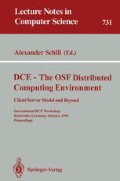Abstract
Within a heterogeneous distributed computing environment, it is necessary to integrate services, such as printing and mail, that are scattered throughout the environment and which perform single logical tasks. This paper discusses a general purpose architecture which provides a framework for designing complex multi-user systems capable of interfacing with these services. The merits of this generalized approach are reflected in the following two case studies of applications being developed by the University of Massachusetts' Project Pilgrim: PIMS (Pilgrim Interface to Mail Systems) and PIPS (Pilgrim Interface to Print Systems). These designs incorporate the principles of this architecture and utilize OSF DCE.
PIPS permits the uniform access of a heterogeneous system's printing facilities and provides support for printing complex multi-document jobs. This interface is platform independent, supports flexible mappings between logical and physical printers and permits all printing resources to be visible throughout the cell. ISO DPA is used for specifying print job attributes and non-DCE systems are also supported. PIMS similarly allows distributed mail clients to work directly with a set of uniform, system independent primitives. This interface remains consistent regardless of the mail environment/system-architecture native to the client or that used to store a given user's mailbox and folders. These primitives allow multiple mailboxes to appear as a single unified (coherent) postbox. This enables operations to be performed on individual messages or folders residing on several different machines regardless of underlying mail protocol, the user's present host, hardware or operating system. PIMS supports variable format messages (multimedia) including executable code, alternate display/audio forms, and message indirection. Various levels of mail access are supported on clients ranging from laptop PCs to supercomputers.
OSF is a trademark of Open Software Foundation
Developed at Project Pilgrim, University of Massachusetts, Amherst
Project Pilgrim is partially funded in part by Digital Equipment Corporation, Hewlett-Packard Company, and University of Massachusetts
Preview
Unable to display preview. Download preview PDF.
References
Open Software Foundation. Introduction to DCE, Revision 1.0. Open Software Foundation, 1991.
Open Software Foundation. Administration Reference. Open Software Foundation, 1991.
Open Software Foundation. Application Development Reference. Open Software Foundation, 1991.
N. Borenstein and N Freed. MIME (Multipurpose Internet Mail Extensious): Mechanisms for Specifying and Describing the Format of Internet Message Bodies, June 1992. RFC 13XX.
Nehru Bhandaru and Kathleen DiBella. Pilgrim event notifier (version 1.0). Under Preparation, 1992.
Rajeev Koodli. Usis: Pilgrim user information service — design document (version 1.0.2). Under Preparation, 1992.
Author information
Authors and Affiliations
Editor information
Rights and permissions
Copyright information
© 1993 Springer-Verlag Berlin Heidelberg
About this paper
Cite this paper
Narkiewicz, J.D., Girkar, M., Srivastava, M., Gaylord, A.S., Rahman, M. (1993). Pilgrim's OSF DCE-based services architecture. In: Schill, A. (eds) DCE — The OSF Distributed Computing Environment Client/Server Model and Beyond. DCE 1993. Lecture Notes in Computer Science, vol 731. Springer, Berlin, Heidelberg. https://doi.org/10.1007/3-540-57306-2_30
Download citation
DOI: https://doi.org/10.1007/3-540-57306-2_30
Published:
Publisher Name: Springer, Berlin, Heidelberg
Print ISBN: 978-3-540-57306-7
Online ISBN: 978-3-540-48048-8
eBook Packages: Springer Book Archive

